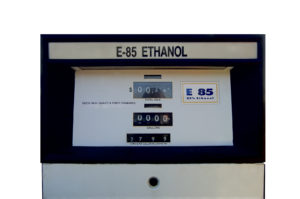Everything You Need to Know About Flex Fuel
September 15th, 2020 by Fix Auto USA

Flexible fuel, aka flex fuel, refers to an alternative fuel that consists of gasoline and ethanol. Cars are available that run on flex fuel gas, and they offer several advantages over automobiles that use traditional gasoline or diesel. To understand these advantages, let’s answer some of the key questions surrounding flex fuel.
What’s Flex Fuel?
Flex fuel is a type of fuel used in cars with an internal combustion engine; this engine can run on more than one type of fuel.
What Does E85 Mean?
E85 contains 85% ethanol and 15% gasoline, and it is the most common type of flex fuel.
How Does a Flex Fuel Car Differ from a Traditional Car?
Like a traditional car, flex fuel cars have a single fuel system, and the components of both types of vehicles are virtually identical. In fact, key components of flex fuel and gas cars include:
- Battery: Delivers electricity to start a car’s engine and power the vehicle’s electronics.
- Exhaust System: Helps a car remove chemical gases from the engine and through the tailpipe.
- Fuel Injection System: Brings fuel to the engine’s combustion chambers for ignition.
- Transmission: Provides mechanical power to the engine to turn the wheels.
Compared to a traditional car, some flex fuel car components have been modified so that they are ethanol-compatible. These flex fuel car components account for the chemical properties and energy content of ethanol.
According to the U.S. Department of Energy, most flexible fuel cars also have an internal combustion capable of operating on gasoline or any combination of gas and ethanol up to 83%. Furthermore, flex fuel cars often have an engine control module (ECM) that is calibrated based on the oxygen content of ethanol.
Does Flex Fuel Save Money?
Motorists who drive flex fuel cars may be eligible for tax credits. Additionally, flex fuel offers other benefits over gasoline, including:
1. Flex Fuel Helps Minimize Toxic Fumes.
Ethanol produces fewer toxic fumes than gasoline. As such, flex fuel cars offer eco-friendly alternatives to gas-powered automobiles.
2. Flex Fuel Is Sustainably Produced.
Ethanol consists of cane sugar, corn, and other natural ingredients. Thus, for those who want a car that runs on sustainably produced fuel, a flex fuel automobile offers a terrific choice.
3. Flex Fuel Helps Improve Your Car’s Performance.
Some flex fuel cars deliver greater torque and horsepower than those that run on gasoline.
Flex Fuel vs. Gas: Which Is the Better Option?
Some of the factors to consider when deciding between flex fuel and gas cars include:
- Cost: Gas car fuel can be more expensive than flex fuel.
- Mileage: Flex fuel tends to provide fewer miles per gallon than gasoline.
- Engine Damage: Ethanol absorbs dirt easily, which can make a flex fuel car’s engine more susceptible to damage.
- Availability: Only a small portion of U.S. gas stations carry flex fuel.
For people who are considering both flex fuel and gas cars, it is generally a good idea to weigh the pros and cons of both options. This ensures that people can make an informed decision about whether a flex fuel or gas car can deliver the maximum return on investment.
Need Auto Body Repairs for Your Flex Fuel or Gas Car? Fix Auto Burbank Can Help
At Fix Auto Burbank, we perform auto body repairs for flex fuel and gas cars. Our certified technicians can perform extensive repairs to your car’s windshield, bumper, and other exterior components and ensure your vehicle looks and performs great. To learn more about our comprehensive auto body repair services or to book an appointment, please contact us online or call us today at (818) 842-2800.
This blog post was contributed by Fix Auto Burbank, a leading industry expert and collision repair shop servicing Downtown Los Angeles and the San Fernando Valley.
Welcome to
Fix Auto USA
We are the premier independent body shop network delivering world-class customer service and high-quality collision repairs across the U.S.
Learn About Us





